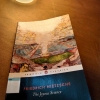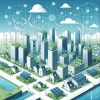What is Energy literacy and why is it important?
There are many definitions of energy literacy, which is has similar meanings. DeWaters and Powers define energy literacy as the domain of basic energy-related knowledge, coupled with an understanding of the impacts of energy production and consumption which means how energy is used in everyday life, and its effect on the environment, also the adoption of energy-saving behaviours.
According to the U.S. department of energy, energy literacy is an understanding of the nature and role of energy in the world and daily lives accompanied by the ability to apply this understanding to choose what energy source they use, how to maintain the resource sustain, to use the energy wisely and providing an effective solution to address long-term issues to solve the problems. Those definitions emphasise three different dimensions: knowledge, attitude, and behavioural intentions towards energy.
In modern society, energy plays a major role in the everyday functions of our life and access to energy is becoming a human right same as education or health, study shows that low literacy rate and inadequate health care facilities have arisen as consequences of poor energy access.
Nowadays, we are facing a challenge in our energy system which is unsustainable and heavily dependent on fossil fuels. In other words, we face three major transformations concerned, those are energy security of supply, and energy access that is cleaner and more sustainable with respect to combat climate change.
Our successful shift into a stable future will rely not only on qualified technical, scientific, and professional expertise, but also on the ability of the average citizen to make appropriate final energy choices, for instance, the mode of transportation, and domestic appliances they use in everyday life, voting habits based on environmental impacts, and acceptance of policies to support changes to the way we harness and consume energy, this is the reason why energy literacy is crucial for the energy transition. In other words, energy literacy encompasses not only the cognitive domain but also the affective and behavioural characteristics, enabling citizens to make appropriate decisions regarding the energy they use, this is in line with IAE's mention that people-centred transitions.
The previous study indicates that culture can complicate and hinder attempts at promoting more efficient, sustainable, and affordable energy use in homes or buildings as well as for low-energy for transport and mobility due to acknowledge barriers to low-carbon energy transition. According to this evidence, energy literacy is seen as a powerful tool that empowers citizens and helps them make informed decisions.
Does Indonesian understand where their electricity come from?
The history of Indonesia's electricity began at the end of the 19th century, even though large-scale electricity networks have existed since the 18th century. Initially, the first power plant in Indonesia was intended for sugar and tea factories since the Dutch colonial until Indonesia took over those companies when Indonesia become independent under the Ministry of Public Works and Power which was formed on 27 October 1945.
Since then, all electricity needs in Indonesia are supplied by only one company: the National Electricity Company (PLN) as the Holder of the Electricity Business Authority (PKUK) to provide electricity for the public interest. These circumstances is totally different if we compare with the situation in a developed nation such as Denmark, where the government encourage public participation in local technology development to deal with energy scarcity as an impact of oil crisis in 1970s.
Due to all electricity needs for the people in Indonesia is provided by the state, means that they do not necessarily know where their electricity come from and how to generate. The initial study has conducted in 2020 to capture energy literacy profile of junior high school student in Indonesia through quantitative descriptive design (open survey methods).
The results indicate that their energy literacy is moderate, but their understanding about the theoretical framework (basic energy knowledge, energy resources issues, common trends of energy in Indonesia and impact of individual and societal decisions related to energy) is relatively low. In addition, students know about energy problems and show their positive attitudes toward them, but they seem lack of knowledge and skills required to overcome these issues for instance they do not really know how to choose energy efficient appliances.
Another study about energy efficiency has been conducted for Maritime Industry in 2019, the result shows that it is important to improve learning period for engineer to increase the cognitive aspects of energy literacy and to improve awareness of energy saving practice. Usually, student first learn about energy is in year 3 at the elementary school. The basic concept about energy sources and how to save it has been introduced but the reason why we must save energy and reduce emission to combat climate change, has not introduced yet.
Are they understand climate change issue?
In response to global climate change as well as distribute energy access, Indonesia set a strategy to scale up renewable electricity generation. Unfortunately, renewable energy project has made a little progress, it can be seen from the total proportion of renewable energy only reach 12,73% of the total electricity generation in 2021, which is a far behind the target of 23% in 2025. There are several reasons on delaying the target, one of them is reliable human resources to renewable energy project that consider is limited. Engineers who work in renewable electricity generation is accounted around 11% of the total engineers who work in power generation. The fact that renewable energy projects from international donor is considered unsuccessful.
Previous study indicates that the first solar PV program were used for rural electrification during 1997 - 2003 failed due to lack of human capital; lower literacy rates and lack of knowledge transferred to the villagers about maintaining solar PV performance, also the users were less concerned about the proper operation of the installed system resulting shorter panels lifetime and unsustainable.
Not only on the supply side but also on the demand side we set strategies to accelerate energy transition through introducing electric cooking stoves to replace gas cooking stoves, Indonesia has the highest electricity consumption rate, and only around 2.7% of people use electricity for cooking as opposed to the 23.8% ratio of LPG usage. It indicates that for households we use electricity in inefficient /in effective ways and still rely on high-carbon intensity.
What is the strategy to improve their knowledge about these issues?
This article argues that both schools and curriculum designers could cultivate enjoyment and interest to build positive attitudes, awareness, and responsibility towards the environment alongside with the development of energy literacy. Introducing energy literacy in the early childhood education including cognitive and social development aspect toward energy is important.
The developers must participate on providing learning tools around its projects to engage with the local community and educate them through seminar, workshop, exhibitions, and other interactive event, which enabling them to learn more about energy technology as well as its problem and global climate change. This is also can be a social responsibility, where the developers and investors would assist with the education of rural and indigenous populations in surround the project area and treat them as assets for their project.
To address this, the governments and developers should prioritize long-term compensation through education, apprenticeship, or training program for the locals, and inviting them to engage with the projects. Establishing a vocational school, university with a focus on renewable energy particularly in outside Java-Bali Island, which has abundant renewable energy potential. On the implementation of the sustainable energy future, embeddedness between society, literacy and resources management is critical point to achieve goals.










